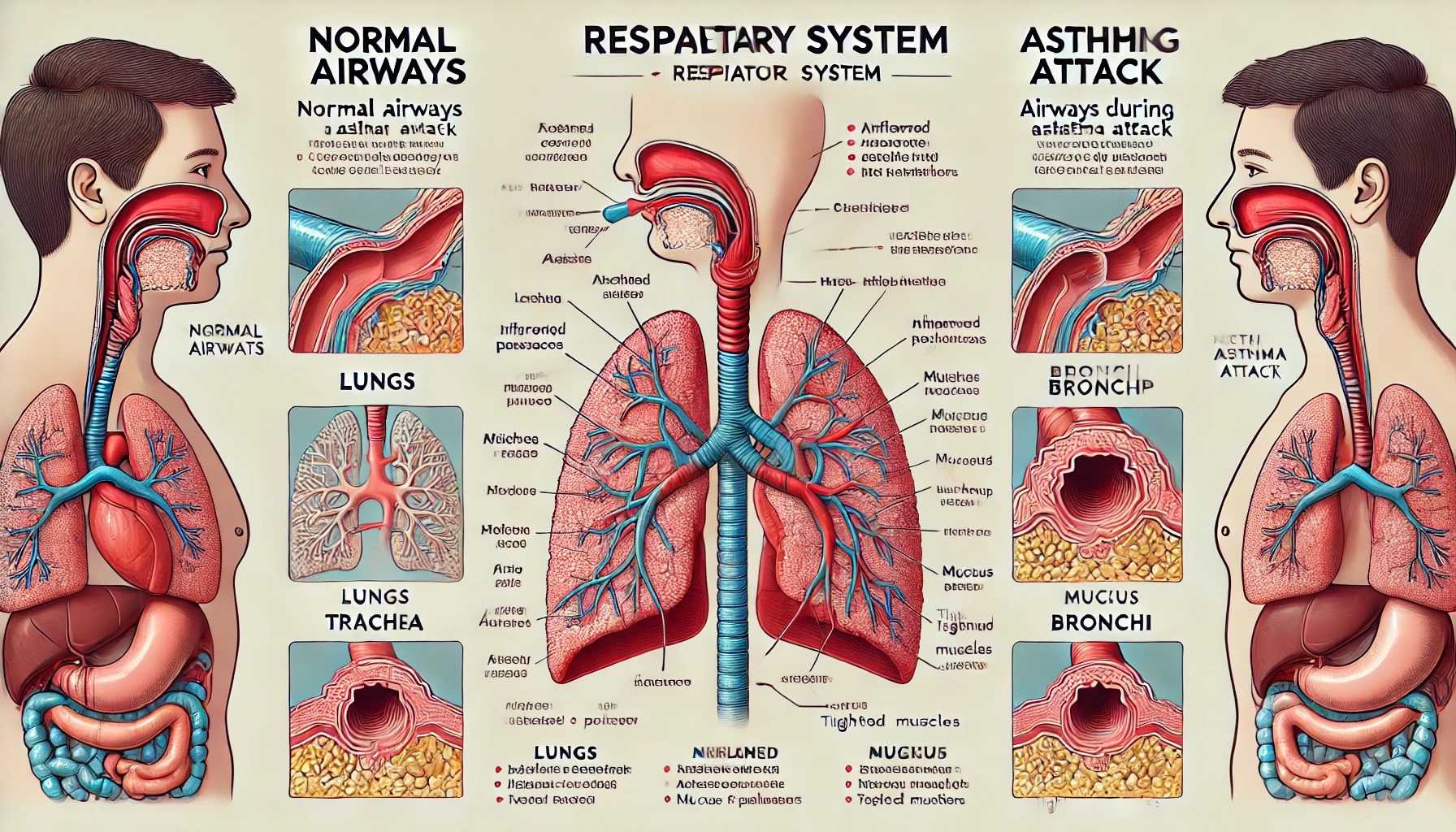Understanding Asthma: Comprehensive Guide
Dr. Jane Doe
7 Sep 2024 • 8 min read
Introduction to Asthma
Asthma is a chronic respiratory condition that affects millions of people worldwide. It causes the airways in the lungs to become inflamed and narrow, leading to difficulty breathing. Asthma can vary in severity from person to person, and while it cannot be cured, it can be effectively managed with the right strategies and treatments.

What is Asthma?
Asthma is a condition in which your airways narrow and swell and may produce extra mucus. This can make breathing difficult and trigger coughing, wheezing, and shortness of breath. For some people, asthma is a minor nuisance. For others, it can be a major problem that interferes with daily activities and may lead to a life-threatening asthma attack.

Types of Asthma
- Allergic Asthma: Triggered by allergens such as pollen, pet dander, or dust mites.
- Non-Allergic Asthma: Triggered by factors like stress, exercise, or cold air.
- Exercise-Induced Asthma: Triggered by physical activity.
- Occupational Asthma: Caused by workplace irritants like chemical fumes, gases, or dust.
- Childhood Asthma: Affects children and can continue into adulthood.

Symptoms of Asthma
- Shortness of Breath: Difficulty breathing or feeling out of breath.
- Chest Tightness or Pain: Discomfort in the chest.
- Wheezing: A whistling sound when breathing.
- Coughing: Especially at night, during exercise, or when laughing.
- Trouble Sleeping: Difficulty sleeping due to breathing problems.

Causes and Risk Factors
Asthma is caused by a combination of genetic and environmental factors. These include:
- Genetics: A family history of asthma increases the risk.
- Environmental Factors: Exposure to allergens, pollutants, and respiratory infections during early childhood.
- Occupational Factors: Exposure to certain irritants at work.
- Lifestyle Factors: Smoking or exposure to secondhand smoke.

Managing Asthma
Managing asthma requires avoiding triggers and taking medications to control symptoms.
- Avoiding Triggers: Common triggers include allergens, smoke, pollution, respiratory infections, cold air, stress, and certain medications.
- Medications: Long-term control medications such as inhaled corticosteroids, and quick-relief inhalers like short-acting beta agonists.
- Asthma Action Plan: A written plan created with your doctor to manage asthma and know how to respond during attacks.

Home Remedies for Asthma
- Ginger: Has anti-inflammatory properties that may help reduce asthma symptoms.
- Garlic: Contains anti-inflammatory properties and may help with asthma.
- Honey: Known for its soothing effects and may help relieve coughing.
- Caffeine: Can act as a mild bronchodilator.
- Mustard Oil: Massaging the chest with mustard oil may help clear the respiratory passages.

Yoga and Breathing Exercises for Asthma
- Pranayama (Breathing Exercises): Helps improve lung function.
- Sukhasana (Easy Pose): Promotes relaxation.
- Ardha Matsyendrasana (Sitting Half Spinal Twist): Opens the chest and improves breathing.
- Bhujangasana (Cobra Pose): Strengthens the respiratory system.
- Shavasana (Corpse Pose): Reduces stress and helps with relaxation.

Monitoring and Testing for Asthma
Regular monitoring and testing can help manage asthma effectively. Common methods include:
- Peak Flow Meter: Measures how well air moves out of your lungs.
- Spirometry: A test used to assess lung function by measuring how much air you inhale, exhale, and how quickly.
- Allergy Testing: Identifies specific allergens that may trigger asthma symptoms.

Advances in Asthma Research and Treatment
- Biologic Therapies: Target specific cells or proteins to prevent inflammation.
- Bronchial Thermoplasty: A procedure that reduces the muscle mass lining the airways, helping to reduce their ability to constrict.
- Genetic Research: Understanding genetic factors that contribute to asthma can lead to personalized treatments.
- Smart Inhalers: Devices that track medication usage and provide reminders.

Conclusion
Asthma is a manageable condition with the right knowledge and tools. By understanding the causes, symptoms, and management strategies, individuals with asthma can lead healthy, fulfilling lives. It's important to stay informed about the latest research and treatment options and to consult healthcare professionals for personalized advice.

Dr. Jane Doe
7 Sep 2024 • 8 min read